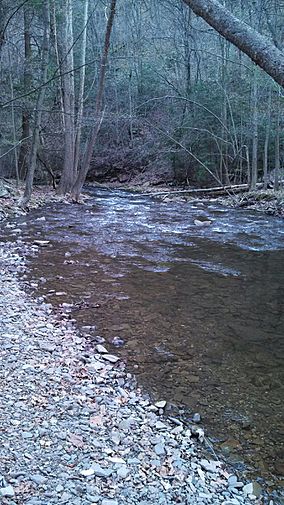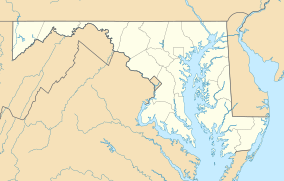Big Run State Park facts for kids
Quick facts for kids Big Run State Park |
|
|---|---|
|
IUCN Category III (Natural Monument)
|
|

Big Run
|
|
| Location | Garrett County, Maryland, United States |
| Nearest town | Grantsville, Maryland |
| Area | 300 acres (120 ha) |
| Elevation | 1,483 ft (452 m) |
| Designation | Maryland state park |
| Administrator | Maryland Department of Natural Resources |
| Website | Big Run State Park |
Big Run State Park is a cool place in Garrett County, Maryland. It's a public park where you can enjoy nature and have fun outdoors. The park covers about 300 acres (120 ha) and is part of the larger Savage River State Forest. It's located right where the Monroe Run and Big Run streams meet the Savage River Reservoir. You can do lots of exciting things here like boating, fishing, hiking, picnicking, and camping!
Contents
Park History
Big Run State Park has an interesting past! It started as a smaller area called Big Run Recreation Area. This area was about 50-acre (20 ha) big. It was developed in the 1930s by a group called the Civilian Conservation Corps. This group helped build many parks and outdoor areas across Maryland.
In 1952, people realized how special the park's location was. It was right next to the new Savage River Reservoir. So, the Maryland State Planning Commission suggested making the park bigger. This way, more people could enjoy its beautiful setting by the water.
Nature at Big Run State Park
Big Run State Park is home to amazing plants and animals. It also has unique weather because it's in the mountains.
Mountain Weather
The park's weather is a lot like mountain weather. Winters are cold, and summers are mild and a bit humid. The park is in the Western Appalachian Plateau region. This area often has cooler temperatures. The Savage River Reservoir sits in a canyon. This canyon can get strong winds, which makes the weather change quickly.
- The coolest month is usually January, with temperatures around 30-34°F.
- The warmest month is typically July, with temperatures around 74-80°F.
- May is usually the wettest month of the year.
Amazing Wildlife
You can spot many different animals living in Big Run State Park.
- Birds: Look up to see birds like the red-tailed hawk and broad-winged hawk. At night, you might hear a great-horned owl or a screech owl. Many songbirds also live here, including the colorful indigo bunting.
- Mammals: Keep an eye out for black bears, bobcats, white-tailed deer, and raccoons.
- Water Animals: Near the reservoir, you might see grouse, great blue herons, minks, and ducks, especially at certain times of the year.
Beautiful Plants
The park's forests are filled with different kinds of trees. You'll find oak, hickory, and other native hardwood trees.
- In April, look for delicate trout lilies and spring beauties blooming.
- In May and June, you might see trilliums and lady slippers.
- In July, colorful rhododendrons, bee balm, and cardinal flowers add to the park's beauty.
Things to Do at Big Run State Park
Big Run State Park offers many fun activities for visitors. You can easily reach the park from Interstate 68, Exit 24, by taking New Germany Road.
Camping and Picnics
The park has different types of campsites. You can find primitive campsites for a more rustic experience. There are also group campsites and youth group campsites for larger gatherings. Pavilions are available if you want to have a picnic or a party. The park's day-use area has special facilities for picnicking.
Boating and Fishing
The Savage River Reservoir is a great spot for water activities. You can use non-motorized boats like canoes or kayaks. Electric motorboats are also allowed. There's a boat ramp to help you get your boat into the water. If you love fishing, you're in luck! The reservoir is home to many kinds of fish. You might catch walleye, largemouth bass, crappie, yellow perch, bluegill, suckers, and different types of trout.
Hiking and Trails
The Monroe Run hiking trail is a popular path that starts from the state park. There are other trails too, perfect for exploring the forest. The Savage River State Forest is right next to the park. It has even more trails that you can use for different purposes. In the winter, these trails are great for snowshoeing or snowmobiling!
 | Percy Lavon Julian |
 | Katherine Johnson |
 | George Washington Carver |
 | Annie Easley |


